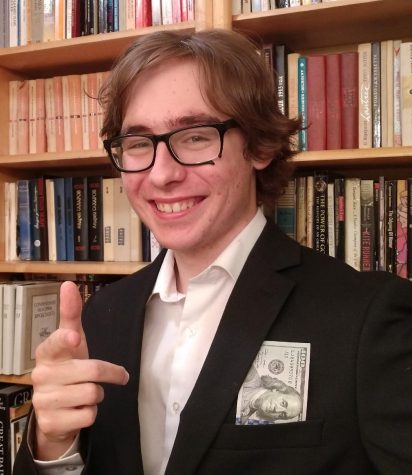Consistent stock market crashes during the pandemic have forced stocks to fall to historic lows, giving small-time investors countless opportunities to get involved in the trade. In quarantine, seniors Peter Budko, Abigail Hagan and Eike Rehwald seized the chance to investigate the ins and outs of the stock market, including the GameStop incident that made headlines this January.
High schoolers navigate the pandemic-era stock market
April 12, 2021
The content in this article is written from a student perspective and should not be taken as endorsed financial advice.
As high school students, most of us bear little to no serious consequences for our money-related decisions. Therefore, stock market investments are often associated with adulthood because one wrong decision might lead you to lose all your savings. It is because of these high stakes that investors are able to learn essential skills such as decision-making, risk-calculating and critical thinking.
Despite all the consequences of the pandemic, it has created unprecedented opportunities for investors to enter the market. With the volatility, or frequent fluctuation, of the market, both long-term investments in recovering industries and short-term investments such as GameStop can yield huge revenues for those participating.
The Talon interviewed seniors Peter Budko, Eike Rehwald and Abigail Hagan about the lessons they’ve learned about investing during the pandemic, as well as their perspectives on the stock market and their journeys to becoming high school investors.
Definitions
Short: A short is the opposite of traditional investment, where instead of investing in a company based on a prediction that the stock will rise, traders predict that a company’s stock will fall based on market trends. When shorting a stock, investors bet that the stock will drop in price and profit if their prediction comes true.
Short Squeeze: A short squeeze is a dramatic increase in a stock’s price in a short period of time after it has been shorted. Those that had bet on the price to fall, or shorted the stock, will lose money for making the wrong prediction. Click here for a detailed explanation of short squeezing.
Hedge fund: A hedge fund is a group of investors who use pooled funds to make high-risk investments while attempting to maximize their profits and reduce their risk from trading. In the GameStop incident, many hedge funds decided to short GME because its stock steadily fell at the beginning of the pandemic.
U.S. Securities and Exchange Commission (SEC): The SEC is a government agency that aims to protect investors in the free market from those who violate federal securities laws.
Stockbroker: A stockbroker is a financial advisor that makes trades for individuals.
Market manipulation: Market manipulation is an action that disrupts the fair and free operation of the stock market.
Zero commission brokers: Zero commission brokers are often applications that allow traders to buy and sell stocks without paying for brokerage services.
Emotional buying: Emotional buying is when investors purchase and sell stocks based on their emotions (usually fear or greed).
The hype: Finding gold mines during the pandemic
To a high school student, working part-time at Teaspoon, getting free boba and earning minimum wage for making drinks might sound like a pretty good deal. But, imagine having the chance to cash in on a 2600 percent return on your stock investments in just a few weeks.
Last November, senior Peter Budko invested all his Teaspoon earnings and more that he borrowed from his broker into GameStop — a video game retailer whose value plummeted at the beginning of the pandemic. After conducting extensive research, Peter was certain that GameStop stock, referred to as “GME,” would continue to rise above his then 2600 percent return. With this certainty, he refrained from selling his stocks even though they had reached an all-time high.
“As you can imagine, losing a 1600 percent return is not a great feeling,” Peter said when asked about his decision to hold the stock instead of selling it at its peak in January. “At the end of the day though, I can’t complain about a 1000 percent return, and I remain confident that there will be a significant bounceback. I just try to keep in mind that thousands of people actually lost money, and millions more never even bought in. Compared to them, I am extremely fortunate.”

After the first major price spike in January, senior Eike Rehwald similarly convinced his father to buy GameStop’s stocks in early February. While his father was initially hesitant to buy in, Eike kept a close eye on the stock and eventually swayed his father to put in some side money.
Both Peter and Eike realized the opportunity to benefit from GameStop early on while following the stock market analysis posted by users on the subreddit thread r/Wall Street Bets. Most users of this thread — known for chasing high-risk investments — are there “just for the ride,” according to Eike. Others, however, are financial professionals who actually came up with the idea of potentially short squeezing GameStop.
Their plan was contingent on the forced closing of more than 462 GameStop stores in 2020 due to the pandemic. As a retailer that depends on physical sales, it seemed almost certain to many hedge fund companies that the GameStop stock would fall dramatically. In order to capitalize on this drop, these companies tried to short GameStop, or bet that the GME stock would fall.
Although shorting is a common strategy on Wall Street, the combination of massive shorting by hedge funds and short squeezing from the side of individual traders is no regular occurrence. The major GameStop incident was a once-in-a-lifetime opportunity created by the abnormal pandemic-era stock market. While GameStop stocks have not had a significant bounceback since their peak price of 483 dollars in January, both Peter and Eike remain confident about their future growth.
Unlike Peter and Eike, senior Abigail Hagan missed out on the opportunity to buy into GameStop at a low price because she didn’t notice its potential profits early enough. While she does express regret for not buying in on time, Abigail recognizes the danger of investing in such a volatile stock.
“I didn’t invest in GameStop because it was too high by the time I got around to it, and I think it’s a really risky stock,” Abigail said. “It’s been really entertaining to watch, but it’s a dangerous day trader’s dream. You can easily become rich off of it if you have the money, [but otherwise,] it fluctuates so dang much every day.”
However, Abigail realized that other than the dramatic GameStop saga, the pandemic also gave rise to a number of long-term investments that often guarantee gains because many stocks were at their all-time lows. Like GameStop, many industries were failing due to travel constraints and stay-at-home orders. Despite these drops, essential industries, such as airlines and food, will almost definitely recover as people will require their services after the quarantine, according to Abigail.
“I looked to the airline industries [at the beginning of the pandemic] because I knew eventually people are going to travel again,” Abigail said. “These airline companies are too big and too global to ever shut down, so it was a pretty safe buy. Then, I realized that airlines need oil, and I bought an oil stock too. While it was bad at first because no one was driving and no one really bought oil, America is going to need oil again, so you might as well buy it. I think it’s smart to bet against yourself in a sense.”
The dark side: The underlying issues of the stock market
While the drama around GameStop is fascinating to follow, Peter and Abigail also commented on some of the more serious issues they’ve uncovered about the American economic, social and political systems surrounding the stock market through the scandal.
By analyzing the console cycle, a trend where the stock price tends to spike after the release of a new gaming console, and the impact of Ryan Cohen, a successful investor who owned 10 percent of GameStop in November last year, Peter had confidence that the newly released PlayStation 5 console and Cohen’s involvement could save the company and recover the stock price. Based on these observations, he believes that the hedge fund companies made a wrong and inconsiderate decision to short GameStop but without rightful consequences.
“The GameStop fiasco is blatant proof that the market is rigged in favor of the rich at the expense of small investors,” Peter said. “The hedge funds which shorted GameStop made a gigantic blunder…which could easily be taken advantage of. They made a mistake and should have been punished for it. Instead, they used illegal market manipulation and backroom deals to bail themselves out of their error, cheating GameStop shareholders out of billions of dollars. Numerous stockbrokers literally suspended the buying of GameStop, only allowing people to sell, citing ‘excessive risk.’”
As an individual investor, Peter compared his financial risk with that of hedge fund companies to describe the inequities within day-to-day trading.
“If I make a stupid trade, I have no such resources,” Peter said. “I don’t know any senators or bank managers or SEC employees. I don’t own any stockbrokers. If I make a stupid trade, and it blows up in my face, I lose everything. Yet, when the hedge funds made terrible and risky investment decisions and rightfully lost on them, they got bailed out and had their losses covered [by stockbrokers].”
Abigail expressed a similar disappointment, claiming that powerful groups such as hedge fund companies are often able to influence the policies regulating the market, while individual investors have no say in the creation or enforcement of the rules put in place by these groups. According to Abigail, this inequity in influence violates the terms for a supposedly free market.
“It’s really upsetting to know that the stock market is really only for the rich people,” Abigail said. “They control it and can do shady things. They can stop the stock market and do things that are literally costing people millions of dollars, and it doesn’t matter [because] they’ll get away with it.”
From a social perspective, both Abigail and Peter found that while hedge fund companies broke the rules of the market and escaped punishment for their role in the GameStop stock scandal, individual traders who followed their rules were the ones portrayed negatively by the major news outlets.
“[People buying into GameStop] are being ridiculed. They are being portrayed as these bad guys who are doing terrible things to our beloved hedge fund companies and are breaking the stock market,” Abigail said. “That’s not the story I saw, right? They’re just trying to make a living for themselves while doing a lot of good things with the money they earned. One person donated over $100,000 to adopting animals, while another gave his profit to a local hospital for kids. These stories are just forgotten. These people are just regular people.”
“Our media is still owned by the rich and is oligopolized into a series of pointless and ideologically bankrupt echo chambers,” Peter said. “The media have pushed the illogical narrative that somehow small investors were at fault for this whole thing.”
While dissatisfied with the biased way the media covered the GameStop scandal, Peter and Abigail are also frustrated by the inaction of politicians to punish those responsible for violating the rules of the free market.
“Our politicians make a big show with Tweets and congressional hearings, yet their ultimate response is flaccid and utterly ineffectual,” Peter said. “The grip of the rich on our country and its institutions is so great that the biggest financial crime of the decade will be forgotten in a few months, without consequence.”
Although downhearted by the unfairness caused by the wealth gap in the U.S., Abigail remains optimistic about the future of individual investors who continue to hold their GME shares.
“I hope [that the individual investors in] GameStop win and that hedge fund companies lose,” Abigail said. “It’d be a monumental time in history where there’s a war against the rich by the poor without violence.”
The journey and the gains: How and why should you invest?
High schools don’t typically teach students how to invest in the stock market, and investment certainly isn’t a common extracurricular activity to pursue as a teen. Despite being a nontraditional bonding activity, both Eike and Abigail were inspired by their fathers to independently explore the stock market and begin making various investments.
“The first time I was interested [in investing] was two or three years ago maybe, because my father had some stocks like AMD (Advanced Micro Devices) and Facebook,” Eike said. “I was [analyzing the behavior] of the stocks on a weekly basis. At the beginning of this year, I was getting a lot more interested in investing and looked through different subreddits [to gain more insight].”
Even though Eike does not consider finance as a potential future career path, he finds investing to be a beneficial hobby and hopes to apply the skills he’s developed well into adulthood.
“Research is definitely very important before you invest because you have to look at the upsides and downsides [of an investment and] weigh them against each other,” Eike said. “Decision-making, critical thinking and conducting research are good skills to [develop].”

Considering the helpful skills they have developed through investing, both Eike and Abigail encourage high school students to get into the field as well. In addition to learning about the stock market from their parents, Eike and Abigail had hoped to expand their understanding through their senior year economics courses but were disappointed that the curriculum covered so little about personal finance.
“I took regular Economics this year, and it has a small bit on investing,” Eike said. “But it’s mainly just, ‘Hey look, there’s the stock market where you can buy stocks that can either go up and go down.’”
“I was hoping AP Microeconomics was going to teach me how to invest,” Abigail said. “But no, it was a bit disappointing because the class had [few] real-life applications. Learning how to invest is essential in life because you want to retire eventually. People want to retire sooner rather than later, so if you make the right investments, you can potentially do that and have financial freedom.”
Abigail’s interest, investing money for retirement, is considered a long-term investment. Abigail, guided by her father’s expertise, discovered the potential of long-term investing and suggests for others to consider this less risky but still profitable option.
“I buy something knowing it will go up,” Abigail said. “Maybe 20 years from now, I will sell it for an extremely high price. It’s a much less stressful process to let a trusted company accumulate wealth over the years and sell it for a really high price years later.”
But Peter disagrees. He believes that high schoolers should and are able to tolerate more risky investments with the advanced technologies available today.
“Just please, for the love of God, do not fall into the trap of long-term investing,” Peter said. “I see so many middle-class adults act like it’s a wise financial decision to park all their money for decades in an over-diversified portfolio for an 8 percent yearly return. This is essentially the lowest possible risk you could take in the stock market, and it will get you nowhere. For a nominal, barely appreciable increase in risk, you could get a colossally greater reward. Adults nowadays are stuck in the 90s, when tools [such as the internet and zero commission brokers] were not available to the average investor. High schoolers should definitely take some amount of risk — how much exactly is up to the individual to decide.”
Peter himself had taken a considerable amount of risk when he invested all his funds in GME. From missing the peak selling price and waiting for a better value, Peter has learned valuable lessons about making major decisions when trading in short-term stocks.
“The thing that really doomed me here was overconfidence,” Peter said. “I was absolutely sure that GME was going to $1000 and beyond, but I failed to consider certain factors, causing me to hold well past the peak (though let me be clear in saying that GME should have gone past $1000, and would have in a fair and free market). I will be more cautious in future trades, and take returns I am happy with, even if I believe I can get more.”
Regardless of whether students choose to take no risk or more risk, according to Abigail, high school students should be careful not to invest their money into stocks without adult guidance.
“You should always have an adult who knows what they are doing to consult you,” Abigail said. “Otherwise, you just feel like, ‘Oh, I wish I did.’ I am grateful for my dad, who had taught me so much and prevented me from making stupid mistakes like emotional buying.”
Despite Abigail, Peter and Eike’s different experiences and opinions on how people should invest, all of them agree that students shouldn’t wait until adulthood to start investing. So why use those five dollars to buy a Creamy Jasmine milk tea when you can put them in the stock market?




